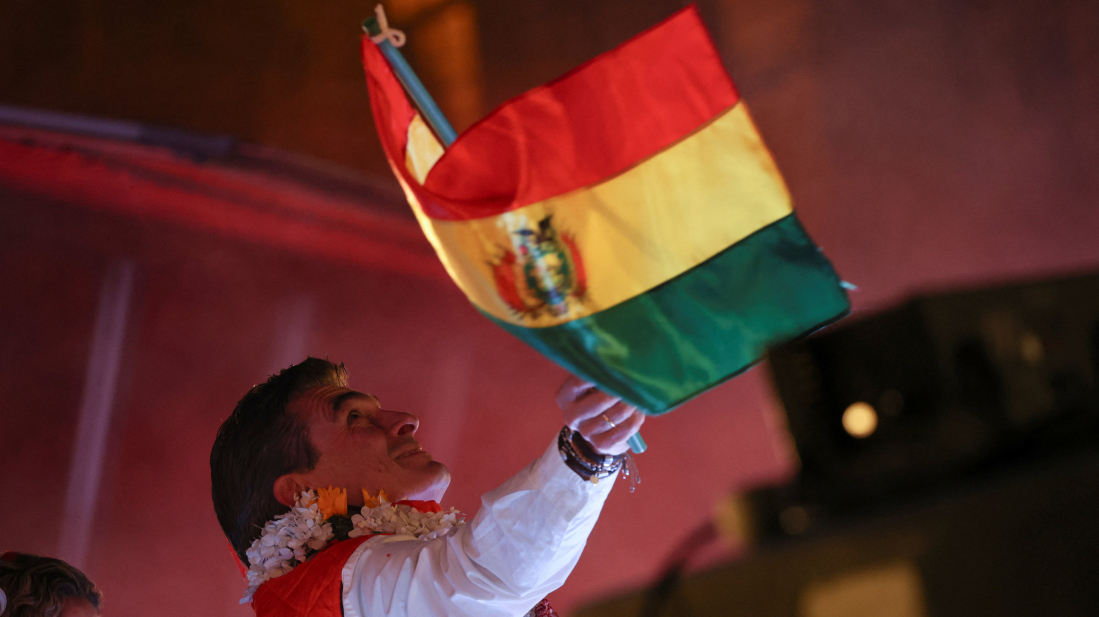Qarabağ FK host Newcastle in Champions League playoff tie
Qarabağ FK are facing Newcastle United in the UEFA Champions League play-off round on Wednesday evening in Baku, in what will be the first UEFA compe...

Centrist Rodrigo Paz won Bolivia's presidential runoff on Sunday, defeating conservative rival Jorge 'Tuto' Quiroga, as the country's worst economic crisis in a generation helped propel the end of nearly two decades of leftist rule.
Paz, a senator from the Christian Democratic Party, won 54.5% of the vote, beating Quiroga's 45.5%, according to early results from Bolivia's electoral tribunal.
But Paz's party does not hold a majority in the country's legislature, which will force him to forge alliances to govern effectively.
The new president takes office on 8 November.
"We must open Bolivia to the world," said Paz during his victory speech from La Paz, after Quiroga conceded defeat.
The 58-year-old senator's win marks a historic shift for the South American country, governed almost continuously since 2006 by Bolivia's Movement to Socialism, or MAS, which once enjoyed overwhelming support from the country's Indigenous majority.
Support for MAS cratered in the August first round amid a deepening economic crisis.
"This election marks a political turning point," said Glaeldys Gonzalez Calanche, analyst for the Southern Andes at International Crisis Group. "Bolivia is heading in a new direction," she said.
Both runoff candidates pledged to strengthen diplomatic ties with Washington — strained since 2009 — and seek U.S.-backed financial support to stabilize Bolivia's fragile economy.
In late September, Paz unveiled plans for a $1.5 billion economic cooperation deal with U.S. officials to ensure fuel supplies.
U.S. Secretary of State Marco Rubio said this week that both presidential candidates "want stronger, better relations with the United States," after decades of anti-American leadership.
Cuba’s fuel crisis has turned into a waste crisis, with rubbish piling up on most street corners in Havana as many collection trucks lack enough petrol to operate.
Ruben Vardanyan has been sentenced to 20 years in prison by the Baku Military Court after being found guilty of a series of offences including war crimes, terrorism and crimes against humanity.
Canadian Prime Minister, Mark Carney, announced on 16 February that the Honourable Janice Charette has been appointed as the next Chief Trade Negotiator to the United States. She's been tasked with overseeing the upcoming review of the Canada-United States-Mexico Agreement (CUSMA).
The Pentagon has threatened to designate artificial intelligence firm Anthropic as a “supply chain risk” amid a dispute over the military use of its Claude AI model, according to a report published Monday.
Israeli airstrikes on southern Lebanon killed two people in 12 hours, Lebanon’s Health Ministry said on Tuesday.
U.S.-mediated talks between Russia and Ukraine in Geneva ended after two days of negotiations that Ukrainian President Volodymyr Zelenskyy described as difficult, while signalling progress on the military track.
Millions of Muslims around the world have begun observing Ramadan, the ninth month of the Islamic lunar calendar and the most sacred period in Islam.
Foreign intelligence services are able to see messages sent by Russian soldiers using the Telegram messaging app, Russia's minister for digital development Maksud Shadayev said on Wednesday, the Interfax news agency reported.
Meta Chief Executive Mark Zuckerberg is expected to testify in a high-profile trial in Los Angeles examining claims that the company’s platforms contributed to youth addiction and mental health harm.
The drumbeats have finally faded at the Marquês de Sapucaí, bringing the competitive phase of the Rio Carnival 2026 to a dazzling close. Over two marathon nights of spectacle, the twelve elite schools of the "Special Group" transformed the Sambadrome into a riot of colour.
You can download the AnewZ application from Play Store and the App Store.

What is your opinion on this topic?
Leave the first comment